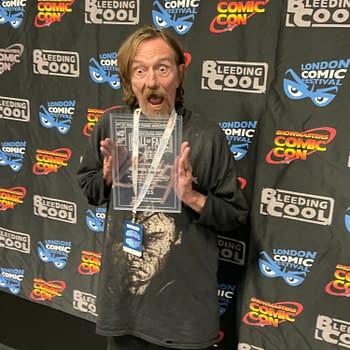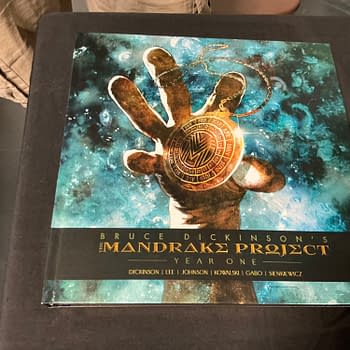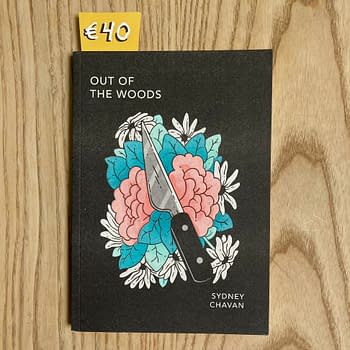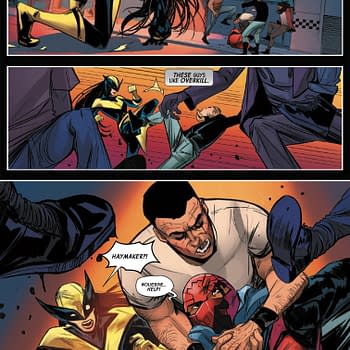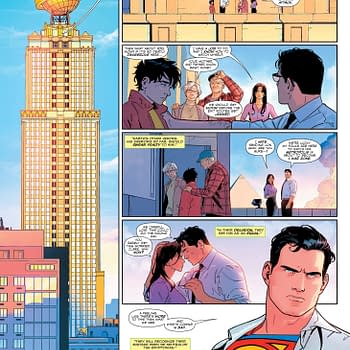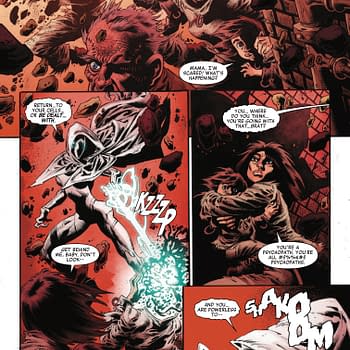Posted in: Comics, Recent Updates | Tagged: andrew wheeler, axel alonso, Comics, hispanic, marvel, MVL, no more mutants
No More Mutants by Andrew Wheeler #8 – All New, Same Difference
Andrew Wheeler writes for Bleeding Cool.
Axel Alonso's recent promotion to editor-in-chief at Marvel has given me renewed hope for the publisher's creative future. I've long had the impression that Alonso is a smart guy with an eye for innovation and a knack for getting the best out of his creators. He seems to take a gratifyingly professional view of comics, unencumbered by ego.
Alonso also has one of the best track records in the business. His past titles include Preacher, 100 Bullets, New X-Men and the Max version of Punisher, plus two of my personal favourites, Milligan and Biukovic's Human Target and the Spider-Man anthology Tangled Web. Sure, his CV also includes two volumes of the unpleasant queer minstrel show Rawhide Kid, but we all make mistakes, and we don't always learn from them.
A Q&A in the Wall Street Journal showed encouraging signs for the new regime. Asked if comics should deal with adult themes, Alonso said, "Absolutely. I think we are shackling ourselves if we treat comics like they're just for kids."
That's not a surprising answer from a man who edited some of Garth Ennis's most successful books, but it's good to hear from the senior editor at a company that has seemed skittishly conservative at times. More relevant to this column is the question of how Alonso intends to address diversity at Marvel. Asked if he thought there was enough diversity in the superhero universe, he put the question through a personal filter;
"There is diversity but there's always room for improvement. I'm half Mexican, and apart from Zapata Brothers, there aren't many Mexican superheroes. Considering how many Mexicans there are in the United States and willing to spend money on comic books, that's kind of shocking."
There are indeed very few Mexican superheroes of note. At Marvel the big names are the current Spider-Girl and X-Factor's Rictor. If Runaways were a going concern, you might add Victor Mancha to that number, though he also belongs to that much larger Marvel minority group, cyborg-Americans.
If one looks beyond Mexico (a country, not an ethnicity) to assess the number of prominent Hispanic or Latino superheroes in comics, the landscape does not change a great deal. The Hispanic population of the United States is considerable. The Hispanic population of the world is not to be sniffed at. Yet Marvel's biggest Latin names beyond Spider-Girl and Rictor are minor leaguers like Sunspot, Rockslide, Echo and White Tiger.
The superhero population of Marvel's America, or Marvel's New York, does not come close to representing reality. Over at DC they have similar problems but bigger names in Renee Montoya, Kyle Rayner and Jaime Reyes, though none of them still has a solo book, and DC also gave us Extraño, Vibe, and Más y Menos, so they have some ground to make up.
Alonso clearly recognises that Marvel could do a better job at diversification, though his interest is in untapped markets rather than on positive representation, and that's nothing to sneer at – Alonso is a businessman, not an artist. Yet I think that too often folks in Alonso's position think that the markets are not there, or not worth tapping, or that reaching them will be too much hard work.
There is some truth to that last point. Some minority audiences are so starved of representation that they will hunt down anything that speaks to them. Gay audience members download foreign-language soap operas in their thousands if they have gay characters in them. Yet it seems clear that efforts to tap the black audience have been far less successful in comics than in film, and efforts to attract a female audience have frequently failed, though the efforts have usually been laughably ill-conceived. The audiences are there. Reaching them takes deliberate effort.
Alonso goes on to say, "The worst thing you can do is say, 'I'm going to create me a Mexican superhero.' You let the character evolve organically in the context of a story."
I disagree. All fiction is contrivance, and if diversity happened by happy accident we would be there already. If you do not build diversity by design, your best intentions will be crushed by the squatting inertia of the majority-dominated status quo, and starting character creation with 'Mexican' is no worse than starting with a superpower or a napkin sketch; it's only a starting point. It's where you go next that makes or breaks the character. If Alonso is serious about reaching Mexican readers who are "willing to spend money on comic books" – or about reaching female readers, Asian readers, gay readers – there's nothing wrong with tailoring product to their interests.
More recently, Alonso gave an interview to The Beat in which he expanded upon his point; "it needs to be an organic creation. You don't go, 'I want to create a gay Superman!' That's not how you do it. The characters have to be rooted, and their ethnicity, their sexuality, need to be shadings of their personality, otherwise you're doomed."
I agree that 'gay Superman' is not a great place to start building a gay character, but more because of the Superman part than the gay part.Superman derivatives are done to death. Marvel has done good business with concepts like 'girl Wolverine' and 'red Hulk', and one of their biggest cash cows is a character whose originating concept could be summed up as 'Deathstroke, but at Marvel'.
Yet Alonso is absolutely right to say that the minority aspects of characters should be "shadings of their personality". The Holy Grail is the character whose minority status is incidental, rather than a broad cliché that defines their words and actions, or worse, their costume and powers.
In that context, the Zapata Brothers – superhuman Mexican luchadores – do not sound like a step forward from characters like the Irish superhero Shamrock, or China's Collective Man. Alonso cites the Rawhide Kid as an example of a book that 'fulfils the mandate' for diversity. That is technically true, but Robert Zimmerman's gay stereotype version of the character was about as inclusive and contemporary as Ebony White or Pieface. I think that Marvel, and Axel Alonso, can do better.
Andrew Wheeler writes about food and comics and gaiety. Sometimes simultaneously. He is the author of Eat Britain!







